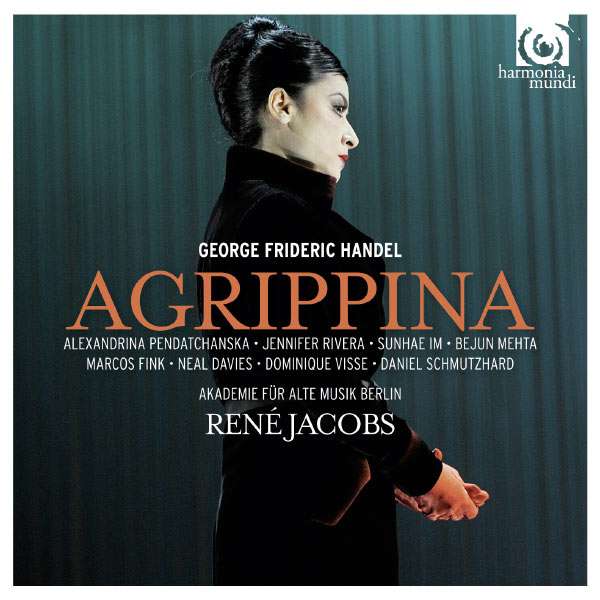|
Back
01/02/2012
George Frideric Handel: Agrippina, HWV 6
Alexandrina Pendatchanska (Agrippina), Jennifer Rivera (Nerone), Sunhae Im (Poppea), Bejun Mehta (Ottone), Marcos Fink (Claudio), Neal Davies (Pallante), Dominique Visse (Narciso), Daniel Schmutzhard (Lesbo), Akademie für Alte Musik Berlin, René Jacobs (Conductor)
Recorded at Teldex Studio Berlin (2009) – 203’
HARMONIA MUNDI Ref. # HMC 902088.90 – Libretto in Italian (original language), English, French and German

For me it is always a joy anticipating a new release by René Jacobs, and his recording of Handel’s early opera Agrippina does not disappoint. Although not Handel’s first opera, it was his first big success and is the highlight of his early Italian period. Agrippina relates the attempts of emperor Claudio’s wife, Agrippina, to put her son from a previous marriage, Nero, on the throne following Claudio’s return from the war in Britain when he is rumoured to be dead. The intrigues involving her manoeuvres and the various (and complicated) amorous attachments among their courtiers make for riveting drama, which is augmented by Handel’s genius for expressiveness and Jacob’s ability to whip the action and music into a frenzy.
For this recording Jacobs uses the “rejected”, original “Ur-version” of the opera, staged by Vincent Boussard at the Deutsche Staatsoper Berlin in 2009. In an essay in the accompanying booklet (which runs to 258 pages!), Jacobs explains the choices he made for including or excluding such an aria or recitative to reconstruct Handel’s original concept. Take, for example, the custom of the “exit aria”. According to Jacobs, Handel was clearly drawn to the dramaturgy of the older Venetian opera, in which recitatives are interrupted by arias only if there is a good reason for doing so. But the young Handel, wishing to please star singers (and by doing so improve his own fortunes) included, for example, exit arias for Ottone and Poppea at the beginning of the third act before they hide behind a curtain, which hardly constitutes exits. There is controversy over Jacobs’ choice of material for his productions (see “Conductor Flies Freely over Critical Gulfs” by John Rockwell in the November 20, 2011 edition of the New York Times), but as this Agrippina attests, his efforts have paid off with a cogent, dramatic production which should satisfy most discriminating listeners.
The sound from the Akademie für Alte Musik Berlin is consistently superb – crisp, gripping and sprightly paced. Jacobs’ tight reign on the musicians ensures a dramatic, almost breathless performance. The nine soloists are stunning. All sing with clear, focussed tone and diction. There is not a hint of vibrato from anyone. The loveliest voice is that of Sunhae Im (soprano) who sings Poppea. She nails finely turned roulades in “Con saggio tuo consiglio” and her “Vaghe perle, eletti fiori” (both from Act 1) sparkles. She brings to mind a young Kathleen Battle. Alexandrina Pendatchanska, as the scheming Agrippina, tosses off her coloratura passages with a flourish. Other standouts are bass-baritone Marcos Fink as Claudio. His sonorous low range thrills in “Cade il mondo soggiogato”. The light, boyish countertenor, Dominique Visse is electrifying as Narciso. Mezzo Jennifer Rivera (Nerone), countertenor Bejun Mehta (Ottone), bass-baritone Neal Davies (Pallante) and bass Daniel Schmutzhard (Lesbo) all sing marvellously. This is a set to treasure for years to come.
Earl A. Love
|